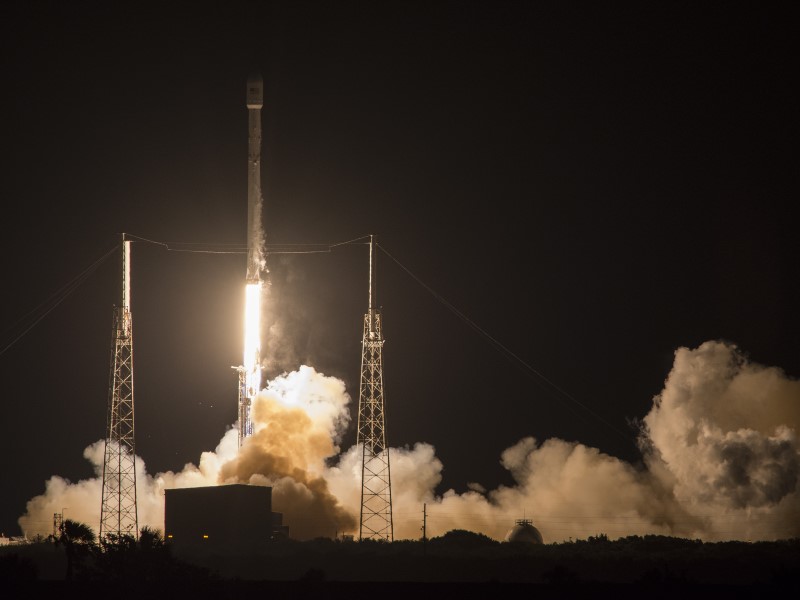- Home
- Science
- Science News
- SpaceX Rocket Blasts Off From Florida on Satellite Delivery Mission
SpaceX Rocket Blasts Off From Florida on Satellite Delivery Mission

An unmanned SpaceX rocket on Friday blasted off from Florida to put a communications satellite into orbit, with the launch vehicle's main-stage booster set to attempt a quick return landing on a floating platform at sea.
A company webcast showed the 23-story-tall Falcon 9 rocket soaring off a seaside launch pad at Cape Canaveral Air Force Station at 1:21am EDT (5:21am GMT).
Perched atop the booster was the JCSAT-14 satellite, owned by Tokyo-based telecommunications company SKY Perfect JSAT Corp, a new customer for Elon Musk's Space Exploration Technologies, or SpaceX.
About 2-1/2 minutes after launch, the rocket's first stage was scheduled to shut down and separate, leaving the second stage to deliver the satellite into its intended orbit more than 25,000 miles (40,000 km) above Earth.
The returning rocket was programmed to fly itself back to a floating landing pad positioned more than 400 miles (650 km) off Florida's east coast in the Atlantic Ocean.
SpaceX successfully landed a rocket on a drone ship in April, after four failed attempts. The company also landed a rocket on a ground-based pad in December, a key step in Musk's plan to develop a cheap, reusable booster.
Before the launch, the company played down expectations for a successful return this time. Unlike the April mission, the rocket flying on Friday would have little fuel left over for engine burns to slow its descent after sending the 10,300-pound (4,700kg) television broadcasting satellite into orbit.
The satellite, built by Space Systems Loral in Palo Alto, California, a subsidiary of MacDonald Dettwiler and Associates, is designed to provide television, data and mobile communications services to customers across Asia, Russia and Oceania and the Pacific Islands.
Friday's launch was the fourth of more than a dozen flights plannd this year by SpaceX, which has a backlog of more than $10 billion (roughly Rs. 66,597 crores) in launch business from customers, including Nasa.
Last week, SpaceX won its first contract to launch a US military satellite, breaking a 10-year-old monopoly held by United Launch Alliance, a partnership of Lockheed Martin Corp and Boeing Co.
© Thomson Reuters 2016
For the latest tech news and reviews, follow Gadgets 360 on X, Facebook, WhatsApp, Threads and Google News. For the latest videos on gadgets and tech, subscribe to our YouTube channel. If you want to know everything about top influencers, follow our in-house Who'sThat360 on Instagram and YouTube.
Related Stories
- Samsung Galaxy Unpacked 2025
- ChatGPT
- Redmi Note 14 Pro+
- iPhone 16
- Apple Vision Pro
- Oneplus 12
- OnePlus Nord CE 3 Lite 5G
- iPhone 13
- Xiaomi 14 Pro
- Oppo Find N3
- Tecno Spark Go (2023)
- Realme V30
- Best Phones Under 25000
- Samsung Galaxy S24 Series
- Cryptocurrency
- iQoo 12
- Samsung Galaxy S24 Ultra
- Giottus
- Samsung Galaxy Z Flip 5
- Apple 'Scary Fast'
- Housefull 5
- GoPro Hero 12 Black Review
- Invincible Season 2
- JioGlass
- HD Ready TV
- Laptop Under 50000
- Smartwatch Under 10000
- Latest Mobile Phones
- Compare Phones
- Moto G15 Power
- Moto G15
- Realme 14x 5G
- Poco M7 Pro 5G
- Poco C75 5G
- Vivo Y300 (China)
- HMD Arc
- Lava Blaze Duo 5G
- Asus Zenbook S 14
- MacBook Pro 16-inch (M4 Max, 2024)
- Honor Pad V9
- Tecno Megapad 11
- Redmi Watch 5
- Huawei Watch Ultimate Design
- Sony 65 Inches Ultra HD (4K) LED Smart TV (KD-65X74L)
- TCL 55 Inches Ultra HD (4K) LED Smart TV (55C61B)
- Sony PlayStation 5 Pro
- Sony PlayStation 5 Slim Digital Edition
- Blue Star 1.5 Ton 3 Star Inverter Split AC (IC318DNUHC)
- Blue Star 1.5 Ton 3 Star Inverter Split AC (IA318VKU)

















